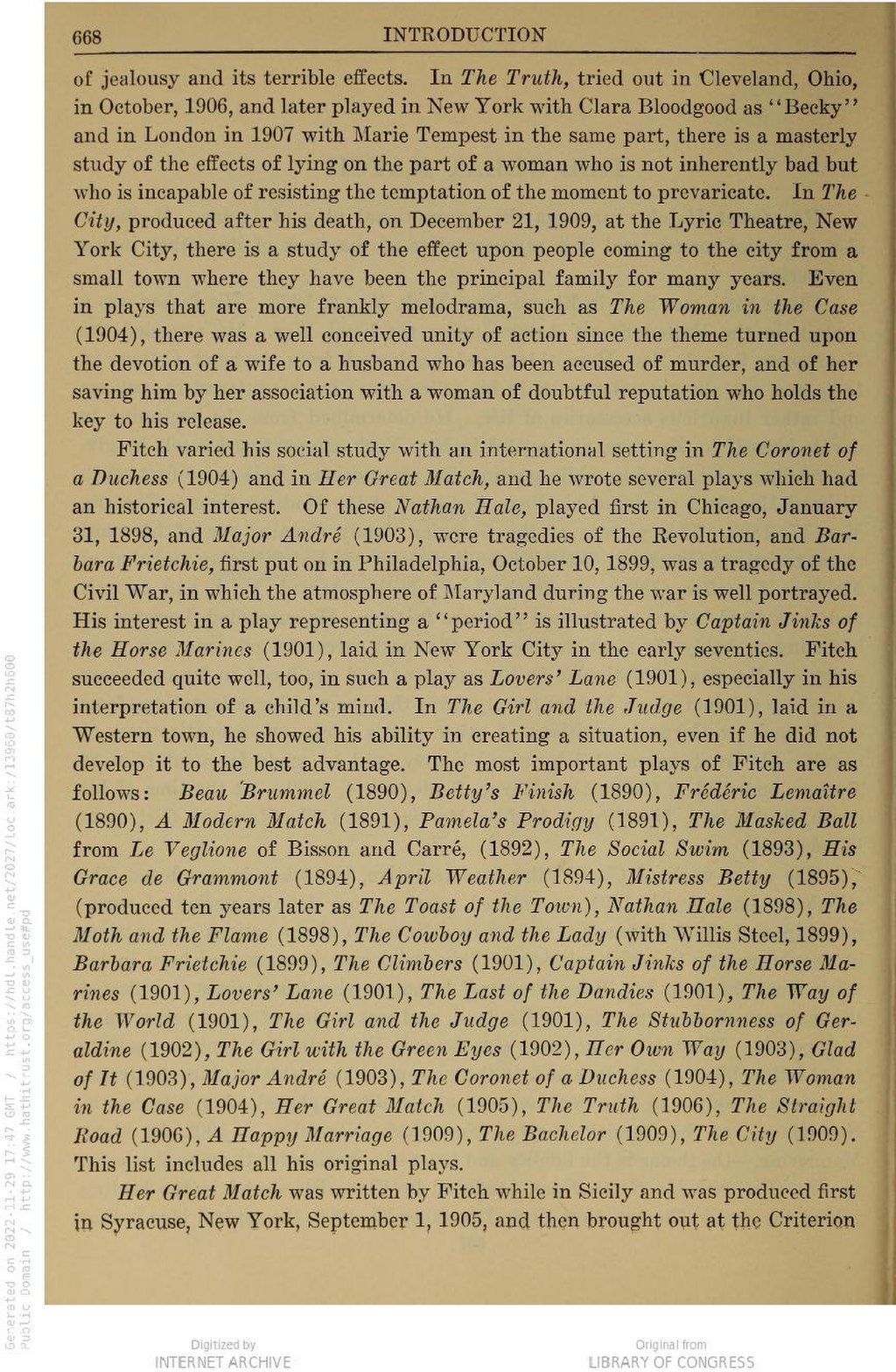of jealousy and its terrible effects. In The Truth, tried out in Cleveland, Ohio, in October, 1906, and later played in New York with Clara Bloodgood as "Becky" and in London in 1907 with Marie Tempest in the same part, there is a masterly study of the effects of lying on the part of a woman who is not inherently bad but who is incapable of resisting the temptation of the moment to prevaricate. In The City, produced after his death, on December 21, 1909, at the Lyric Theatre, New York City, there is a study of the effect upon people coming to the city from a small town where they have been the principal family for many years. Even in plays that are more frankly melodrama, such as The Woman in the Case (1904), there was a well conceived unity of action since the theme turned upon the devotion of a wife to a husband who has been accused of murder, and of her saving him by her association with a woman of doubtful reputation who holds the key to his release.
Fitch varied his social study with an international setting in The Coronet of a Duchess (1904) and in Her Great Match, and he wrote several plays which had an historical interest. Of these Nathan Kale, played first in Chicago, January 31, 1898, and Major André (1903), were tragedies of the Revolution, and Barbara Frietchie, first put on in Philadelphia, October 10, 1899, was a tragedy of the Civil War, in which the atmosphere of Maryland during the war is well portrayed. His interest in a play representing a "period" is illustrated by Captain Jinks of the Horse Marines (1901), laid in New York City in the early seventies. Fitch succeeded quite well, too, in such a play as Lovers' Lane (1901), especially in his interpretation of a child's mind. In The Girl and the Judge (1901), laid in a Western town, he showed his ability in creating a situation, even if he did not develop it to the best advantage. The most important plays of Fitch are as follows: Beau Brummel (1890), Betty's Finish (1890), Frederic Lemaitre (1890), A Modern Match (1891), Pamela's Prodigy (1891), The Masked Ball from Le Veglione of Bisson and Carré, (1892), The Social Swim (1893), His Grace de Grammont (1894), April Weather (1894), Mistress Betty (1895), (produced ten years later as The Toast of the Town), Nathan Hale (1898), The Moth and the Flame (1898), The Cowboy and the Lady (Avith Willis Steel, 1899), Barbara Frietchie (1899), The Climbers (1901), Captain Jinks of the Horse Marines (1901), Lovers' Lane (1901), The Last of the Bandies (1901), The Way of the World (1901), The Girl and the Judge (1901), The Stubbornness of Geraldine (1902), The Girl with the Green Eyes (1902), Her Own Way (1903), Glad of It (1903), Major André (1903), The Coronet of a Duchess (1904), The Woman in the Case (1904), Her Great Match (1905), The Truth (1906), The Straight Road (1906), A Happy Marriage (1909), The Bachelor (1909), The City (1909). This list includes all his original plays.
Her Great Match was written by Fitch while in Sicily and was produced first in Syracuse, New York, September 1, 1905, and then brought out at the Criterion
